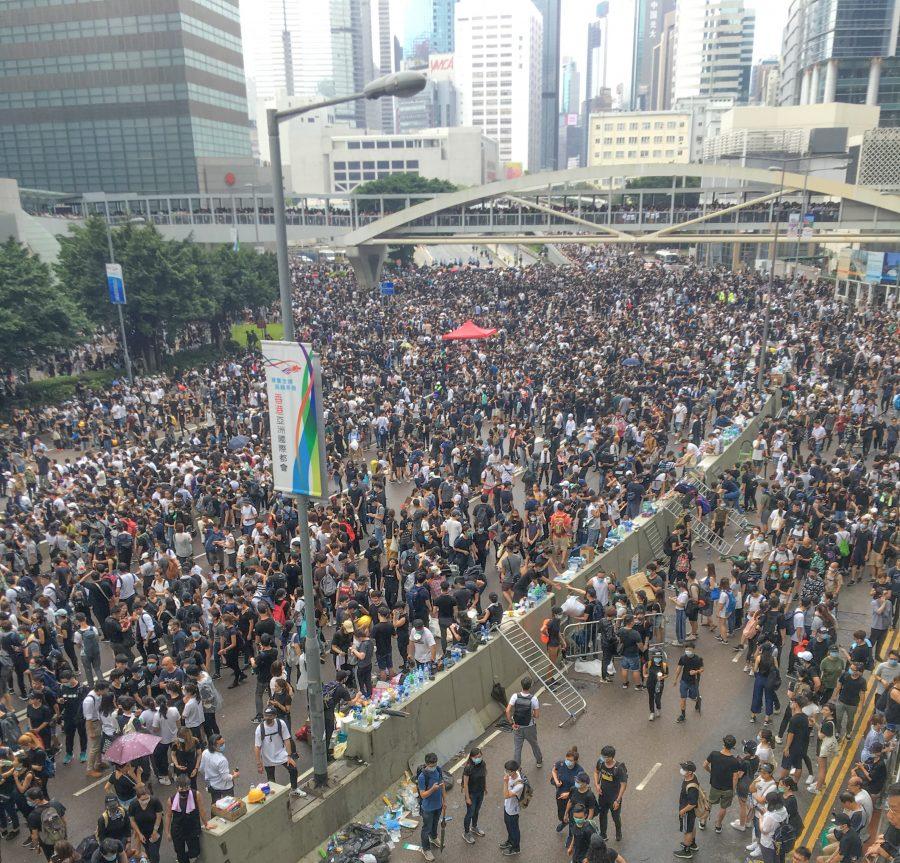While millions have taken to the streets of Hong Kong to protest a bill that would give China more power over the mainly autonomous region, students who call the city home are now watching, sidelined, from New York.
Hong Kong’s troubles started with a murder. Residents of the city, Chan Tong-kai, 19, and his girlfriend, Poon Hiu-wing, 20, went on a Valentine’s Day trip to Taiwan during which Chan strangled Poon to death. Hong Kong police wanted to hand over — or extradite — Chan to Taiwanese authorities, but the city does not have an extradition agreement with Taiwan. And so, the Hong Kong government proposed one. However, what seemed like a simple attempt to solve a problem, critics said was a way for China to assert more power over Hong Kong.
This is because the extradition bill would not only allow Hong Kong to send criminals to Taiwan, but to China, too. The country had already encroached on Hong Kong’s temporary autonomy (its independence is protected by a law which expires in 2047, when the city will presumably return to Chinese rule) through abducting booksellers that sold unflattering literature about the Chinese Communist Party and a billionaire financially tied to influential Chinese politicians.
Many of those protesting the bill have done so out of fear that it would be used to charge and extradite Hong Kong residents critical of the mainland and reduce the overall freedom of the city. The autonomous region has a more just and fair legal system than China — protestors worry that an extradition law could allow the country to impose authoritarian rule over Hong Kong.
Since then, multiple protests — some peaceful, some violent — have taken place, with millions participating and police resorting to tear gas and rubber bullets. The bill has been tabled but protestors have made other demands that include Chief Executive Carrie Lam’s resignation, protestors being absolved of their crimes, an inquiry into police brutality and greater democratic freedoms overall.
Liberal Studies first-year Dylan Yen — who was in Hong Kong this summer — was personally affected by the protests.
“Every single day I had to wear a gas mask when I would go home,” Yen said. “Police gassed the subway station where I would get home so I would have to walk through tear gas.”
Yen said he was stopped by the police six times simply because he looked young.
“I felt helpless,” Yen said. “I was just a normal kid. I was coming home from work and the police stop me and decided to put handcuffs on me just because I was young and wearing a gas mask.”
CAS junior Christy Wong said she knew many people personally who participated in the protests. At one point, a friend of hers couldn’t get home due to fires stopping public transit.
“Things have become pretty violent so everyone has just been worried about their own safety. This is new for all Hong Kongers because [Hong Kong] was once the top [three] safest city in the whole world,” Wong wrote in a text message to WSN. “Now, youngsters may get targeted while they’re out in public even if they’re not participating in the protests.”
Wong said she does not agree with the extradition law, but does think the protests have gone too far.
“I was born and raised in Hong Kong. Hong Kong’s autonomy and rule of law would always concern me,” Wong wrote. “I’m personally against the extradition law. However, the protests have escalated into something different recently.”
Wong worries that political or other interest groups may be using the protests as a way to prevent a policy that will hurt them. Chinese businessmen who don’t want their assets seized and those who oppose Lam are two parties she mentioned.
“This is a murky situation where people have begun to take advantage of the young protestors and use them as political tools for their own political gains,” Wong wrote.
Steinhardt first-year Marcus Wong sees the situation differently. Like Christy, he thinks the protests are fine in theory but have gotten out of hand. However, he does not agree that the extradition bill is something to be concerned over.
“I personally think it’s dumb,” Marcus Wong said. “When you think about it, you’d only be caught in the crosshair with China if you’re doing something that’s against China. If you’re a normal person, why do they have to catch you?”
Marcus cited the interdependency Hong Kong and China have, saying that China needs to have peace with Hong Kong to maintain its reputation, and Hong Kong needs China to function. Protestors who have turned violent and, in some cases, harassed other civilians, should not be labeled as heroic, Marcus said.
“They fail to realize that they’re not just creating revolution and helping the weak, they’re causing harm to a lot of people that don’t stand by what they’re thinking,” Marcus Wong said. “So I think this is the part when I’d say, the protesting right now, at this moment, has gone too far.”
CAS senior Kristie Chan does not live in Hong Kong, but her family is from there and she has lived in the city in the past. Having watched Instagram stories from her friends who are on the frontlines of the protests, Chan does not think protestors are to blame for the violence.
“I can see that the police are acting out of hand a lot of the time,” Chan said. “Nobody is beating the police. It’s all self-defense.”
Chan said that the protests have implications for when the Basic Law that gives Hong Kong its independence expires.
“The feelings in these protests aren’t something that can be fixed in 2047,” Chan said. “It exposes some irreconcilable differences between Hong Kong and China. The government can’t ignore that going forward.”
Additional reporting by Claire Jones.
A version of this article appeared in the Monday, Sept. 16, 2019 print edition. Email Victor Porcelli at [email protected].


























































































































































